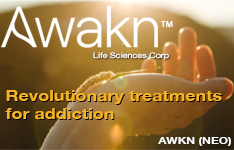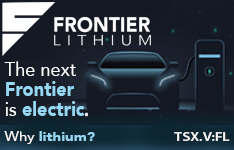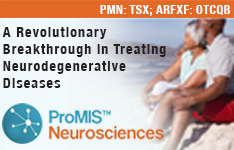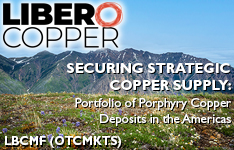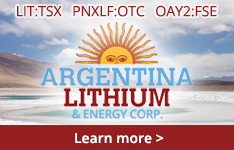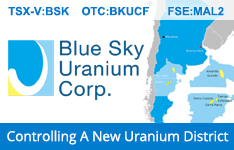Clinical-stage biotech firm NervGen Pharma Corp. (NGEN:TSX.V; NGENF:OTCQX), which is striving to develop innovative treatments capable of restoring damage to the nervous system due to injury or disease, today announced that "the University of Cincinnati and Case Western Reserve University (CWRU) have published a pioneering preclinical study in the peer-reviewed scientific journal Cell Reports demonstrating that NervGen's proprietary drug, NVG-291-R, promotes nervous system repair and significant functional recovery in a mouse model of severe ischemic stroke, even when treatment was initiated up to seven days after onset."
NervGen Pharma advised that to date the U.S. Food and Drug Administration (FDA) has not approved any drugs designed to repair damage occurring from a stroke. The company noted that it holds the exclusive worldwide rights to NVG-291 which it is presently testing for safety and tolerability in a Phase 1 clinical study. The firm is currently organizing a Phase 1b/2 clinical trial with the objective of determining the efficacy of NVG-291 for repairing nervous system damage from spinal cord injury, Alzheimer's disease, and multiple sclerosis.
The company advised that in the peer-reviewed study referenced above, NVG-291-R demonstrated improved memory as well as motor and sensory functions in rodents even when treatment did not begin until seven days after the onset of a stroke. The fact that beneficial results may be achievable after that much time has elapsed may make enrollment in future clinical trials easier. NervGen remains optimistic that the drug could potentially offer a brand-new treatment paradigm for stroke patients.
Dr. Agnes (Yu) Luo, Associate Professor, Department of Molecular Genetics and Biochemistry at the University of Cincinnati, remarked, "We are very excited about the data showing significant improvement in motor function, sensory function, spatial learning, and memory, even when treatment was initiated as late as seven days after stroke onset … If these results translate to the clinic, NVG-291 would be a substantial breakthrough in the treatment of stroke patients for multiple reasons because the only current FDA-approved drug for the treatment of stroke does not repair damage and must be administered within four-and-a-half hours of stroke onset."
Dr. Luo added, "Most therapies being researched need to be applied within 24 to 48 hours of a stroke's onset; in contrast, our preclinical data shows that treatment with NVG-291-R is effective even if applied as late as seven days after the stroke's onset."
Dr. Jerry Silver, Professor of Neurosciences at CWRU's School of Medicine, co-author of the Cell Reports paper, and inventor of NervGen's technology stated, "This is another remarkable demonstration of NVG-291's potential to repair damage to the nervous system … We demonstrated that NVG-291-R repaired damage using at least two modes of repair: first by substantially increasing plasticity resulting in the creation of new neuronal connections, and second by enhanced migration of newly born neurons derived from neuronal stem cells to the site of damage."
Dr. S. Claiborne Johnston, a leading specialist in stroke care and research, formerly the inaugural Dean at Dell Medical School and now a professor in the Department of Neurology at Dell Medical School at The University of Texas at Austin., noted that "The fact that NVG-291-R showed an effect in an animal model seven days after the onset of stroke is very encouraging … An agent that works this late and through this mechanism could be much easier to test in trials and could ultimately help many more stroke patients than current therapies … Most therapies in development for stroke focus on minimizing the extent of initial damage from a stroke, which means that to be effective they must be administered within the first hours after symptom onset."
The company's President and CEO Paul Brennan commented, "This is a very important development for NervGen as, for the first time in a peer-reviewed publication, NVG-291-R demonstrated improvements in memory and spatial learning which may be relevant for other indications affecting cognition, such as Alzheimer's disease, where it might improve cognition rather than simply slowing cognitive decline … While we remain committed to developing NVG-291 in our core indications of spinal cord injury, Alzheimer's, and multiple sclerosis, this paper provides a very strong argument to undertake a stroke study with NVG-291."
"Given this compelling new preclinical data, we believe there is a solid opportunity to secure non-dilutive funding to advance the program through a partnership, either with industry or government," Brennan added.
The firm stated that it holds the exclusive worldwide rights to NVG-291 which it explained is "a therapeutic peptide that mimics the intracellular domain of the receptor protein tyrosine phosphatase sigma (PTPσ), a cell surface receptor known to interact with chondroitin sulfate proteoglycans (CSPGs)," and pointed out that "PTPσ and CSPGs have both been shown to inhibit neural repair mechanisms following nervous system damage."
Each year about 800,000 people in the U.S. suffer from a stroke, with about 75% of these incidents being the first event and 25% occurring in individuals who have previously experienced one or more strokes. The disease takes place in blood vessels leading to and within the brain. Healthy blood vessels carry oxygen and nutrients to the brain, but when a pathway is blocked by a clot or ruptures, oxygen-rich blood does not flow freely to the brain which causes brain cells in the area to die and if not caught and treated in time can often lead to brain damage, disability, and death.
NervGen Pharma is a clinical-stage biotech firm based in Vancouver, B.C. Canada. The company is working to create and develop innovative treatments aimed at restoring damage to the nervous system caused by injury or disease. NervGen's leading drug candidate called NVG-291 is presently being evaluated in a Phase 1 clinical trial in healthy volunteers to evaluate the safety, tolerability, and metabolism. The firm notes that NVG-291 is administered by subcutaneous injection and shows potential to become a first-in-class therapeutic for treating nervous system damage from either injury or disease. The company is presently evaluating NVG-291 for use in treating Alzheimer's disease, spinal cord injuries, and multiple sclerosis.
NervGen Pharma Corp. began today with a market cap of around $108.7 million with approximately 47.9 million shares outstanding. NGENF shares opened today at around $1.83 (+$0.05, +2.81%) from yesterday's $1.78 closing price. The stock has traded today between $1.7262 and $1.8746 per share and is currently trading at $1.7568 (-$0.0156, -0.88%).
| Want to be the first to know about interesting Biotechnology / Pharmaceuticals investment ideas? Sign up to receive the FREE Streetwise Reports' newsletter. | Subscribe |
Disclosures
1) Stephen Hytha wrote this article for Streetwise Reports LLC and provides services to Streetwise Reports as an independent contractor. He or members of his household own securities of the following companies mentioned in the article: None. He or members of his household are paid by the following companies mentioned in this article: None.
2) The following companies mentioned in this article are billboard sponsors of Streetwise Reports: None. Click here for important disclosures about sponsor fees.
3) Comments and opinions expressed are those of the specific experts and not of Streetwise Reports or its officers. The information provided above is for informational purposes only and is not a recommendation to buy or sell any security.
4) The article does not constitute investment advice. Each reader is encouraged to consult with his or her individual financial professional and any action a reader takes as a result of information presented here is his or her own responsibility. By opening this page, each reader accepts and agrees to Streetwise Reports' terms of use and full legal disclaimer. This article is not a solicitation for investment. Streetwise Reports does not render general or specific investment advice and the information on Streetwise Reports should not be considered a recommendation to buy or sell any security. Streetwise Reports does not endorse or recommend the business, products, services or securities of any company mentioned on Streetwise Reports.
5) From time to time, Streetwise Reports LLC and its directors, officers, employees or members of their families, as well as persons interviewed for articles and interviews on the site, may have a long or short position in securities mentioned. Directors, officers, employees or members of their immediate families are prohibited from making purchases and/or sales of those securities in the open market or otherwise from the time of the decision to publish an article until three business days after the publication of the article. The foregoing prohibition does not apply to articles that in substance only restate previously published company releases.
6) This article does not constitute medical advice. Officers, employees and contributors to Streetwise Reports are not licensed medical professionals. Readers should always contact their healthcare professionals for medical advice.







